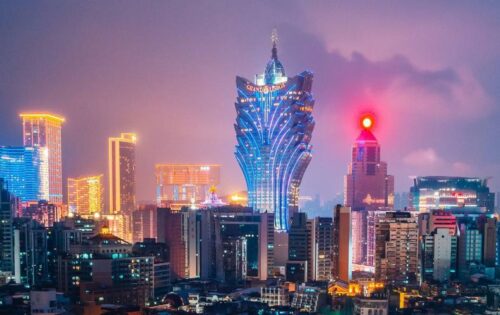Unchecked Cyberattacks Are Growing Threat to Global Economy
https://www.travelfoundation.org/wp-content/uploads/2023/01/unchecked-cyberattacks-are-growing-threat-to-global-economy.jpg 500 337 wttc2 wttc2 https://secure.gravatar.com/avatar/f32e30472292b23ca8d97703bc75bc06084af5c6a75bff8a62378cc7662b5894?s=96&r=g
 Davos-Klosters, Switzerland, January 27, 2023 / TRAVELINDEX / Adoption of connected devices during the pandemic led to a dramatic increase in cyberattacks. According to a new report launched today at the World Economic Forum Annual Meeting 2023, if left unchecked, the cost of cyberattacks will continue to rise, threatening a fragile global economy.
Davos-Klosters, Switzerland, January 27, 2023 / TRAVELINDEX / Adoption of connected devices during the pandemic led to a dramatic increase in cyberattacks. According to a new report launched today at the World Economic Forum Annual Meeting 2023, if left unchecked, the cost of cyberattacks will continue to rise, threatening a fragile global economy.
The report, The State of the Connected World 2023 edition, a collaboration of the World Economic Forum with the Council on the Connected World, says the immediate threats can be mitigated through robust security protocols and governance through public-private cooperation.
The State of the Connected World is the only global report that tracks and quantifies governance gaps for the universe of connected devices, known as the internet of things (IoT). The report surveyed 270 experts around the world to understand the state of play and establish clear priorities for technology governance.
“At a time when the global economy is fragile, we have the necessary tools to reduce at least one of the major threats to the global economy – cyberattacks,” said Jeff Merritt, Head of Urban Transformation, World Economic Forum. “The State of the Connected World report is a call to action for protecting against cybercrimes, which would also improve individual security and protect small and medium-sized business, transit systems, utilities – everything that relies on connected devices.”
“Our increasingly connected existence brings with it vulnerabilities that can be exploited by malicious actors,” said Akshay Joshi, Head of Industry and Partnerships, Centre for Cybersecurity, World Economic Forum. “Despite calls for embedding cybersecurity by design, the low level of confidence in the security of connected devices expressed by experts in this report is a testament to the fact that we still have a long way to go in terms of realizing trust in the technology we use.”
The report calls for increased consumer education through digital literacy campaigns, standardization practices of cybersecurity measures, prioritizing security by design and default (as opposed to reacting after the fact) and developing more agile policies to better address the quick-changing landscape of cybersecurity.
“We find ourselves at an inflection point this year with a number of global forces putting downward pressure on the economy,” said Madeline Carr, Professor of Global Politics and Cyber Security, Department of Computer Science, University College London. “It is essential that cybersecurity challenges are not left unchecked to further exacerbate this but are taken seriously as an integrated element of a thriving global economy.”
What other experts are saying:
“Open standards in technology have always led to greater innovation and greater consumer confidence. This year’s report from the Forum really emphasizes the importance of that direction. We’re very pleased to see the focus on privacy and security as a key priority. Solving for these ensures the greatest adoption of IoT, and the greatest likelihood of landing on valuable solutions for consumers in the ever-growing connected world.”
Tobin Richardson, President and CEO, Connectivity Standards Alliance
“Planned spending on a security programme costs less than unplanned spending by 10 to 100 times, so it really makes sense now to evaluate and redouble your efforts to attain and maintain a mature programme. The year 2023 is predicted to deliver a perfect storm – from expected challenging economic conditions, ransomware up over 30% from last year, cyber insurance rates dramatically rising, coverage lowering, a severe skill and staff shortage, massive growth in vulnerable IoT connected devices and security products becoming the breach vector. Now is the time to redouble your focus on your security posture.”
Peter Nicoletti, Field Chief Information Security Officer of the Americas, Check Point Software Technologies
“At Schneider Electric, we envision a fully connected, net-zero world which is more electrified, digitized and sustainable for future generations. To realize this future, businesses, organizations and governments must work together to address challenges such as cybersecurity, open standards and accessibility. I’m proud of our work with these stakeholders and the World Economic Forum and commit to continued vigilance to make the needed progress.”
Scott Harden, Chief Technology Officer, Innovation, Schneider Electric
“As the world gets more connected, complex and at times unpredictable, it is critical to drive and govern the change in a way that we not only address and mitigate risks but also emphasize the positive impact that connected technology brings.”
Anton Kotov, Chief Digital and Strategy Officer, ABB Electrification, ABB
“The ongoing advancement of emerging technologies highlights the importance of establishing strong governance to ensure safe and secure use of the technology. Security, privacy, trust and interoperability among IoT devices are serious issues that need to be addressed to accelerate IoT adoption and embrace a connected world. This can be achieved through collective action from the international community and by establishment of public-private partnerships. The 2023 report on the state of the connected world highlights the current gaps in governance and paves the path to address the associated risks for the benefit of humankind.”
Mariam Nouh, Vice-President of Economies of the Future Sector, King Abdulaziz City for Science and Technology (KACST)
“In order to ensure that connected devices and related technologies are accessible and beneficial for all members of society, adaptive and sustainable governance is needed for multistakeholders to expand the boundaries of their respective scope of works, to share risk and co-invest in the digital infrastructure together.”
Fanyu Lin, CEO, Fluxus
About the World Economic Forum Annual Meeting 2023
The World Economic Forum Annual Meeting 2023 convenes the world’s foremost leaders under the theme Cooperation in a Fragmented World. It calls on world leaders to address immediate economic, energy and food crises while laying the groundwork for a more sustainable, resilient world.
First published at TravelNewsHub.com – Global Travel News











